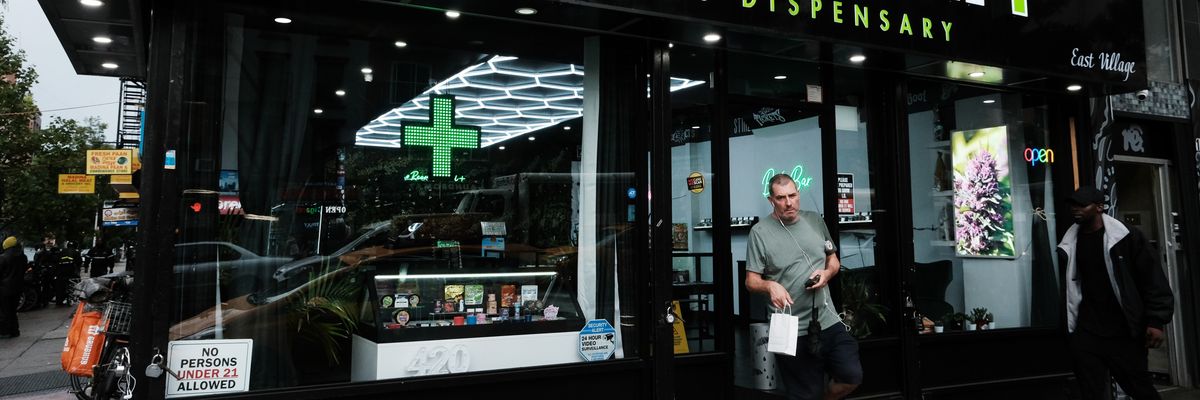
A legal cannabis dispensary stands in New York City on June 16, 2023 in New York City.
Mastercard Move at Cannabis Shops Intensifies Call for US Decriminalization
"An industry that employs hundreds of thousands of people, provides billions in economic benefits, and promotes safer alternatives to pharmaceuticals and commonplace vices continues to be treated like a pariah," said one cannabis entrepreneur.
Cannabis reform advocates on Friday said a new decision by credit card company Mastercard illustrates why the substance must be decriminalized at the federal level to ensure that legal U.S. dispensaries are able to operate safely and securely.
The company announced this week that it has instructed U.S. financial institutions to stop allowing customers to use its debit cards to purchase marijuana products at cannabis stores, which now operate legally in 38 states for medicinal use and 23 states for recreational use, as well as in the District of Columbia.
Mastercard said it made the decision because marijuana remains criminalized at the federal level, despite major progress in recent years as the Marijuana Opportunity Reinvestment and Expungement (MORE) Act was passed by the U.S. House last year.
Darren Weiss, president of multistate cannabis operator Verano Holdings, said Mastercard's decision shows how the industry is still treated as a "pariah" despite its annual national sales projected to reach $57 billion by 2030, or as much as $72 billion including several states where cannabis is expected to be legalized.
A number of advocates including Sen. Jeff Merkley (D-Ore.) said Mastercard's move demonstrates the need for the Secure and Fair Enforcement (SAFE) Banking Act, which would protect banks and credit unions for being penalized by federal regulators for working with legal cannabis stores.
"I will not stop pushing to get SAFE Banking passed so legal cannabis businesses can access necessary financial services," said Merkley. "Cannabis businesses are still in dire need, and the majority of the country with state-legalized recreational cannabis can't wait."
While expressing appreciation for the SAFE Banking Act and its advocates in Congress, Weiss pointed out that the legislation would not address the fact that marijuana is criminalized at the federal level, which was the objection Mastercard said it has to working with cannabis dispensaries.
"SAFE Banking as drafted won't fix the credit card issue, and Mastercard's position won't change as a result," said Weiss. "We need comprehensive cannabis reform, and we need it yesterday."
The "awful news," said Columbia University fellow Raúl Carrillo, "shows the pitfalls of trying to reform cannabis finance without decriminalizing and legalizing weed on the federal level."
An Urgent Message From Our Co-Founder
Dear Common Dreams reader, The U.S. is on a fast track to authoritarianism like nothing I've ever seen. Meanwhile, corporate news outlets are utterly capitulating to Trump, twisting their coverage to avoid drawing his ire while lining up to stuff cash in his pockets. That's why I believe that Common Dreams is doing the best and most consequential reporting that we've ever done. Our small but mighty team is a progressive reporting powerhouse, covering the news every day that the corporate media never will. Our mission has always been simple: To inform. To inspire. And to ignite change for the common good. Now here's the key piece that I want all our readers to understand: None of this would be possible without your financial support. That's not just some fundraising cliche. It's the absolute and literal truth. We don't accept corporate advertising and never will. We don't have a paywall because we don't think people should be blocked from critical news based on their ability to pay. Everything we do is funded by the donations of readers like you. Will you donate now to help power the nonprofit, independent reporting of Common Dreams? Thank you for being a vital member of our community. Together, we can keep independent journalism alive when it’s needed most. - Craig Brown, Co-founder |
Cannabis reform advocates on Friday said a new decision by credit card company Mastercard illustrates why the substance must be decriminalized at the federal level to ensure that legal U.S. dispensaries are able to operate safely and securely.
The company announced this week that it has instructed U.S. financial institutions to stop allowing customers to use its debit cards to purchase marijuana products at cannabis stores, which now operate legally in 38 states for medicinal use and 23 states for recreational use, as well as in the District of Columbia.
Mastercard said it made the decision because marijuana remains criminalized at the federal level, despite major progress in recent years as the Marijuana Opportunity Reinvestment and Expungement (MORE) Act was passed by the U.S. House last year.
Darren Weiss, president of multistate cannabis operator Verano Holdings, said Mastercard's decision shows how the industry is still treated as a "pariah" despite its annual national sales projected to reach $57 billion by 2030, or as much as $72 billion including several states where cannabis is expected to be legalized.
A number of advocates including Sen. Jeff Merkley (D-Ore.) said Mastercard's move demonstrates the need for the Secure and Fair Enforcement (SAFE) Banking Act, which would protect banks and credit unions for being penalized by federal regulators for working with legal cannabis stores.
"I will not stop pushing to get SAFE Banking passed so legal cannabis businesses can access necessary financial services," said Merkley. "Cannabis businesses are still in dire need, and the majority of the country with state-legalized recreational cannabis can't wait."
While expressing appreciation for the SAFE Banking Act and its advocates in Congress, Weiss pointed out that the legislation would not address the fact that marijuana is criminalized at the federal level, which was the objection Mastercard said it has to working with cannabis dispensaries.
"SAFE Banking as drafted won't fix the credit card issue, and Mastercard's position won't change as a result," said Weiss. "We need comprehensive cannabis reform, and we need it yesterday."
The "awful news," said Columbia University fellow Raúl Carrillo, "shows the pitfalls of trying to reform cannabis finance without decriminalizing and legalizing weed on the federal level."
- 80+ Groups Mark 4/20 With Call for Biden to End Federal Marijuana Prohibition ›
- Sanders Says Stop Busting People for Marijuana and Start 'Prosecuting Crooks on Wall Street' ›
- Marijuana Justice Coalition Applauds 'Long Overdue' Senate Legalization Bill ›
- 'Rescheduling Is Not Enough,' Advocates Say of HHS Cannabis Recommendation ›
- Senators Unveil Bipartisan SAFER Banking Act for Legal Marijuana Industry ›
- Marijuana Industry Banking Bill Passes Key Senate Panel ›
- Opinion | The Verdict Is In: Legalizing Weed Works | Common Dreams ›
Cannabis reform advocates on Friday said a new decision by credit card company Mastercard illustrates why the substance must be decriminalized at the federal level to ensure that legal U.S. dispensaries are able to operate safely and securely.
The company announced this week that it has instructed U.S. financial institutions to stop allowing customers to use its debit cards to purchase marijuana products at cannabis stores, which now operate legally in 38 states for medicinal use and 23 states for recreational use, as well as in the District of Columbia.
Mastercard said it made the decision because marijuana remains criminalized at the federal level, despite major progress in recent years as the Marijuana Opportunity Reinvestment and Expungement (MORE) Act was passed by the U.S. House last year.
Darren Weiss, president of multistate cannabis operator Verano Holdings, said Mastercard's decision shows how the industry is still treated as a "pariah" despite its annual national sales projected to reach $57 billion by 2030, or as much as $72 billion including several states where cannabis is expected to be legalized.
A number of advocates including Sen. Jeff Merkley (D-Ore.) said Mastercard's move demonstrates the need for the Secure and Fair Enforcement (SAFE) Banking Act, which would protect banks and credit unions for being penalized by federal regulators for working with legal cannabis stores.
"I will not stop pushing to get SAFE Banking passed so legal cannabis businesses can access necessary financial services," said Merkley. "Cannabis businesses are still in dire need, and the majority of the country with state-legalized recreational cannabis can't wait."
While expressing appreciation for the SAFE Banking Act and its advocates in Congress, Weiss pointed out that the legislation would not address the fact that marijuana is criminalized at the federal level, which was the objection Mastercard said it has to working with cannabis dispensaries.
"SAFE Banking as drafted won't fix the credit card issue, and Mastercard's position won't change as a result," said Weiss. "We need comprehensive cannabis reform, and we need it yesterday."
The "awful news," said Columbia University fellow Raúl Carrillo, "shows the pitfalls of trying to reform cannabis finance without decriminalizing and legalizing weed on the federal level."
- 80+ Groups Mark 4/20 With Call for Biden to End Federal Marijuana Prohibition ›
- Sanders Says Stop Busting People for Marijuana and Start 'Prosecuting Crooks on Wall Street' ›
- Marijuana Justice Coalition Applauds 'Long Overdue' Senate Legalization Bill ›
- 'Rescheduling Is Not Enough,' Advocates Say of HHS Cannabis Recommendation ›
- Senators Unveil Bipartisan SAFER Banking Act for Legal Marijuana Industry ›
- Marijuana Industry Banking Bill Passes Key Senate Panel ›
- Opinion | The Verdict Is In: Legalizing Weed Works | Common Dreams ›

